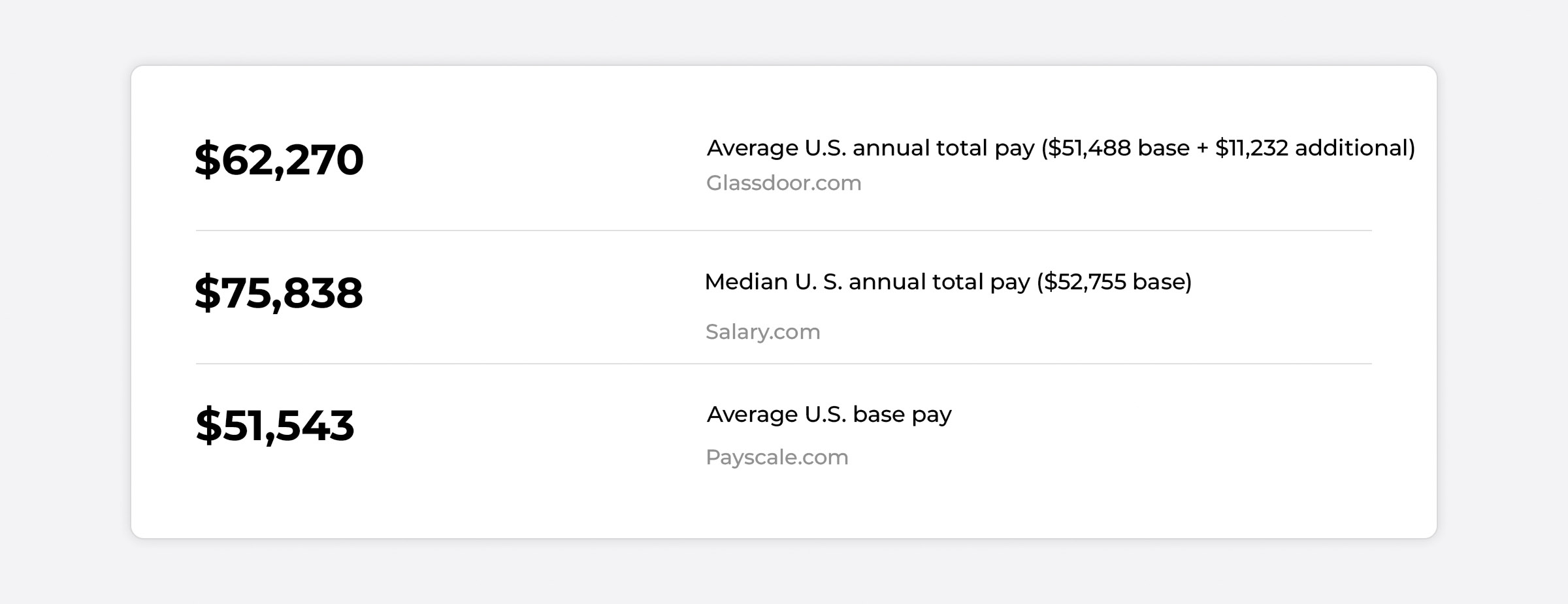Introduction
Are you earning enough as a veterinary practice manager?
In this article, we take a closer look at a state-by-state comparison of veterinary practice manager (VPM) salaries, duties, and the career ladder you need to climb.
We bring together data from a number of sources, and also include a table showing the annually, monthly, and the hourly average for veterinary earnings across the U.S. In this table, we also include the average taxation rates for every state, so you can get a clear idea of what your take-home earnings should be.

Veterinary practice manager job description: what does a VPM do?
A veterinary practice manager holds a managerial and leadership position within a veterinary team or practice. A VPM does not, and rarely has to be, a qualified vet.
And yet, VPMs play a key role in veterinary practices, whether as part of a group or with a small independent vet.
Practice managers usually have a team of receptionists reporting to them, plus any other administrative and support staff, depending on the size of the veterinary practice. While qualified vets look after patients, practice managers are responsible for the business side of operations and are therefore looking after the veterinarians.
Veterinary practice managers are responsible for hiring, training, and managing support staff (HR), operations, budgets and financial forecasts, marketing, setting fees, managing and monitoring KPIs across the practice, health and safety, software, and inventory control.
In so many ways, veterinary practices couldn’t operate successfully without an effective veterinary practice manager. They play a crucial role in the leadership team. It’s the role of a VPM to ensure the vets within a practice can work effectively on behalf of patients and the practice.
Veterinary practice managers look after clients and manage the whole client relationship, while also implementing activities that bring in new clients. All of this supports the overall business goals and objectives of veterinary practices.
What career path does a veterinary practice manager need to follow?
It can take several years to become a veterinary practice manager.
In most cases (76%), it’s useful or essential to have a bachelor’s degree in either business or a related field. This way, you’ve got industry-specific skills, especially if you can complete an internship in an administrative role, or even better, a veterinary practice while pursuing your undergraduate degree.
Upon entering the workforce, gaining on-the-job training and skills in an administrative or business-oriented role is a necessary first step toward becoming a practice manager. Basic software skills (Microsoft), along with more advanced cloud-based software experience are useful, in addition to client relationship experience, admin, customer services, HR, or marketing.
Don’t worry if you can’t gain experience before applying for practice manager roles. In many practices, you can start at entry-level as a receptionist or in an admin/HR, or business-related support role within a veterinary practice. Full training is usually provided.
Recommend you:
How Much Do Vets Make in Different U.S. States
Veterinary Burnout Researched and Explained
Best Veterinary Conferences for 2022
…and our other posts!
In most cases, two years in an entry-level role should give you enough experience to advance in your career either at the practice you are currently working at or at a different one. You can now start applying for managerial roles, such as an assistant veterinary practice manager, or go straight for a veterinary practice manager position when one becomes available.
Advancement can continue to more senior positions, within a VPM capacity, depending. on the size of the practice, or whether you’re willing to relocate to find more opportunities to advance your career. Along the way, if you can pick up more qualifications and training a practice could provide you with, that should further help you advance your career.
State-by-state veterinary practice manager salaries comparison table
| State | Average Annual Total Pay (Glassdoor) * salary + additional pay | Average Annual Salary (ADP Payroll Database) | Average Monthly salary (ADP Payroll Database) | Hourly Salary (Average) * 40 hours per week | Real Tax Rate |
| Washington | $66,602 | $56,663 | $4,722 | $27.24 | 17.2% |
| New York | $65,650 | $53,370 | $4,447 | $25.66 | 22.2% |
| New Hampshire | $68,362 | $51,665 | $4,305 | $24.84 | 16.9% |
| California | $66,443 | $50,565 | $4,214 | $24.31 | 21.9% |
| Massachusetts | $71,484 | $48,825 | $4,069 | $23.47 | 22.1% |
| Vermont | $66,795 | $48,758 | $4,063 | $23.44 | 20.7% |
| Wyoming | $63,896 | $47,716 | $3,976 | $22.94 | 16.9% |
| Idaho | $62,568 | $47,573 | $3,964 | $22.87 | 21.8% |
| Hawaii | $72,822 | $47,342 | $3,945 | $22.76 | 24.2% |
| Maine | $67,475 | $46,844 | $3,904 | $22.52 | 22.1% |
| West Virginia | $58,832 | $46,379 | $3,865 | $22.30 | 21.4% |
| Texas | $64,143 | $46,128 | $3,844 | $22.18 | 16.9% |
| Connecticut | $67,733 | $46,109 | $3,842 | $22.17 | 24.4% |
| Pennsylvania | $65,614 | $45,595 | $3,800 | $21.92 | 20.0% |
| Rhode Island | $69,552 | $45,393 | $3,783 | $21.82 | 22.0% |
| Montana | $64,292 | $45,212 | $3,768 | $21.74 | 22.1% |
| New Jersey | $69,071 | $45,132 | $3,761 | $21.70 | 19.8% |
| Alaska | $64,790 | $45,084 | $3,757 | $21.68 | 17.3% |
| Maryland | $66,100 | $44,910 | $3,742 | $21.59 | 21.4% |
| Arizona | $64,416 | $44,747 | $3,729 | $21.51 | 19.6% |
| North Dakota | $64,008 | $44,747 | $3,729 | $21.51 | 18.0% |
| Nevada | $65,097 | $44,729 | $3,727 | $21.50 | 16.9% |
| Indiana | $60,329 | $44,460 | $3,705 | $21.38 | 20.1% |
| Nebraska | $63,730 | $44,194 | $3,683 | $21.25 | 21.9% |
| Minnesota | $61,854 | $43,852 | $3,654 | $21.08 | 22.5% |
| Tennessee | $60,265 | $43,829 | $3,652 | $21.07 | 16.9% |
| Wisconsin | $59,787 | $43,683 | $3,640 | $21.00 | 22.5% |
| Virginia | $62,817 | $43,615 | $3,635 | $20.97 | 21.7% |
| Ohio | $59,455 | $43,510 | $3,626 | $20.92 | 19.6% |
| South Dakota | $62,088 | $43,440 | $3,620 | $20.88 | 16.9% |
| Georgia | $62,208 | $43,166 | $3,597 | $20.75 | 21.9% |
| Utah | $65,221 | $42,919 | $3,577 | $20.63 | 21.9% |
| Oregon | $64,889 | $42,778 | $3,565 | $20.57 | 24.1% |
| Louisiana | $62,216 | $42,528 | $3,544 | $20.45 | 20.5% |
| South Carolina | $60,671 | $42,184 | $3,515 | $20.28 | 23.1% |
| Alabama | $61,232 | $42,157 | $3,513 | $20.27 | 21.0% |
| Kansas | $60,095 | $42,151 | $3,513 | $20.26 | 21.5% |
| Colorado | $64,926 | $42,033 | $3,503 | $20.21 | 21.1% |
| Delaware | $67,328 | $41,971 | $3,498 | $20.18 | 21.4% |
| Iowa | $61,487 | $41,831 | $3,486 | $20.11 | 21.3% |
| New Mexico | $66,732 | $41,507 | $3,459 | $19.96 | 20.7% |
| Oklahoma | $61,647 | $41,075 | $3,423 | $19.75 | 21.0% |
| Florida | $63,930 | $40,684 | $3,390 | $19.56 | 16.9% |
| Kentucky | $57,452 | $40,193 | $3,349 | $19.32 | 21.7% |
| Mississippi | $63,013 | $39,488 | $3,291 | $18.98 | 21.2% |
| Arkansas | $59,517 | $39,471 | $3,289 | $18.98 | 21.2% |
| Michigan | $62,214 | $39,444 | $3,287 | $18.96 | 21.2% |
| Illinois | $62,187 | $39,257 | $3,271 | $18.87 | 21.9% |
| Missouri | $59,628 | $38,612 | $3,218 | $18.56 | 20.7% |
| North Carolina | $60,923 | $35,948 | $2,996 | $17.28 | 21.2% |
Conclusion
Veterinary practice managers play an integral role in the success of a veterinary practice.
As we have found, the average salary base in the U.S. is about $52,000. Of course, this varies by state, seniority, and the type of practice you are working at. You might find that in larger groups where there are more commercial clients, salaries are going to be higher.
If you aren’t happy with what you are earning from your years of hard work and study, then consider working at Galaxy Vets. We offer the proven highest salaries within the market. In addition, you’ll receive an equity share for your effort after working here for a certain time.
Thinking about selling your veterinary practice?
Want to find more of our articles related to practice management in the veterinary industry? Check our Learning Center.


